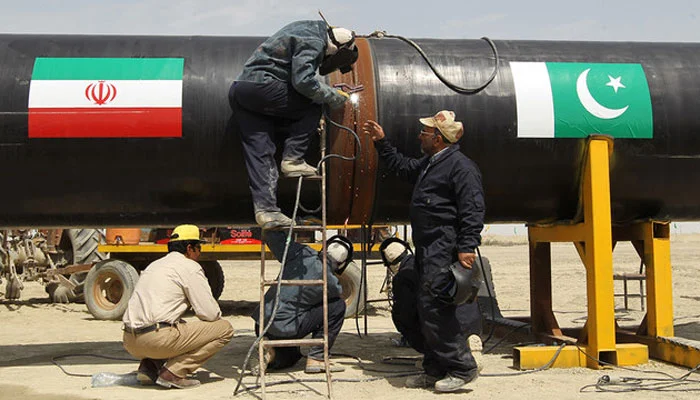Iranian Foreign Minister Hossein Amir Abdollahian presented a feasible solution for the completion of the Iran-Pakistan IP gas pipeline project during talks with Pakistani officials.
In a bid to overcome challenges posed by U.S. sanctions, Iranian Foreign Minister Hossein Amir Abdollahian presented a feasible solution for the completion of the Iran-Pakistan IP gas pipeline project during talks with Pakistani officials. The proposal suggests financial backing from China and Russia, addressing concerns raised due to possible delays in the project.
Diplomatic Talks and Gas Pipeline Financing Proposal
During a day-long visit, Iranian Foreign Minister Hossein Amir Abdollahian engaged in delegation-level talks with Pakistan’s caretaker Foreign Minister.
The proposal for financing the Iran-Pakistan IP gas pipeline project through collaboration with China and Russia was the focal point of discussion. This initiative aims to counter potential resistance arising from U.S. sanctions on Tehran, providing an alternative pathway for the completion of the crucial energy project.
Sources privy to the development revealed that Abdollahian clarified misconceptions regarding potential penalties on Pakistan if the project is not completed by the initial deadline of Feb-March 2024, which has reportedly been extended to September 2024.
Security and Counterterrorism Measures
Amidst recent tensions between the two nations, the foreign ministers discussed security concerns, focusing on counterterrorism efforts. Both sides agreed to appoint liaison officers in Turbat and Zahidan to enhance security and intelligence cooperation. A Joint Coordination Mechanism at the foreign ministers’ level was also established to oversee common agendas for prosperity and development.
Abdollahian, speaking at a joint news conference, emphasized that Iran and Pakistan would jointly combat terrorism, particularly in border regions. Both nations affirmed their commitment to each other’s sovereignty and territorial integrity, pledging to prevent terrorists from endangering shared security.
Economic and Development Cooperation
In addition to security matters, the diplomats discussed expanding economic and development initiatives. Both foreign ministers agreed to expedite the operationalization of joint border markets to uplift the socio-economic conditions of border region residents. The establishment of a Joint Coordination Mechanism reflects their commitment to fostering bilateral ties for mutual prosperity.
Pilgrimage Tourism and Energy Cooperation
The Iranian foreign minister highlighted the need to expand pilgrimage tourism and finalize energy cooperation projects. Abdollahian commended Pakistan’s support for the Palestinian people, and both nations expressed their commitment to continued collaboration on regional and global issues.
De-escalation of Recent Tensions
The visit occurred against the backdrop of de-escalated tensions between Iran and Pakistan. Recent strikes by both nations in response to terrorist activities near their borders led to a temporary deterioration of relations. However, the diplomatic discussions and proposals for economic cooperation signify a renewed commitment to stability and cooperation.
Conclusion and Future Prospects
Caretaker Foreign Minister emphasized the importance of collective efforts in confronting terrorism, highlighting the existing institutional mechanisms between the two countries. Both sides reiterated their respect for sovereignty and territorial integrity and pledged to work collaboratively to address mutual concerns.
The Iranian foreign minister’s visit, undertaken at short notice, underscores the depth of commitment to solidifying ties between Iran and Pakistan.
The proposal for China and Russia’s financial support for the gas pipeline project reflects a strategic move to navigate challenges posed by external sanctions. As both nations work towards resolving differences and strengthening ties, the future holds prospects for enhanced economic cooperation, security collaboration, and shared development.
